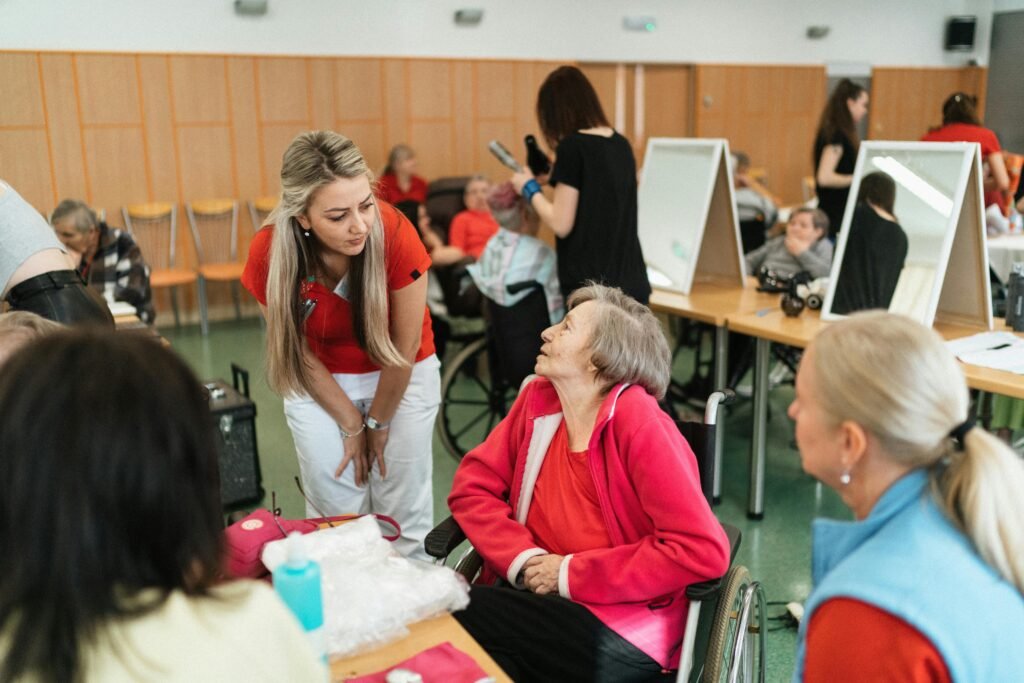
Bridge the Gap: How to Care for Your Aging Parent from Another State
The Home Doctor – Practical Medicine for Every Household
Intro
As we journey through life, the roles we play often shift and evolve. One of the most profound transitions many of us face is when our parents, who once cared for us, now require our care as they age.
This delicate and emotional phase can bring about a mix of feelings – from love and gratitude to fear and uncertainty. In this heartfelt guide, we will explore how to navigate the complexities of caring for aging parents while also taking care of yourself as a caregiver.
Understanding the Emotional Landscape of Aging Parents

When we step into the role of caring for our aging parents, we embark on a journey not just through the physical aspects of care but also through a complex emotional landscape.
Our parents, who have been the pillars of strength and independence in our lives, may now face a myriad of emotions as they confront the realities of aging. This transition can evoke feelings of vulnerability, a sense of loss for their younger selves, and perhaps a fear of the unknown.
It’s a profound change that can stir up feelings of resistance or sadness, as they grapple with the need for assistance in tasks that were once second nature. Empathy and compassion become our most powerful tools in navigating this emotional terrain.
Recognizing that behind every forgetful moment or expression of frustration is a deeper struggle can help us approach our parents with the gentleness they deserve. It’s important to validate their feelings, showing understanding and patience as they adjust to this new phase of life.
Engaging in heartfelt conversations can also provide a sense of comfort and assurance to our parents. By asking about their fears, listening to their stories, and validating their emotions, we create a space where they feel seen and heard.
This open dialogue fosters a deeper connection, making it easier to tackle the practicalities of care with a foundation of mutual respect and understanding.
As we navigate this emotional landscape together, it’s vital to remember that these feelings are a natural part of the aging process.
By acknowledging and addressing these emotions with compassion, we not only provide our parents with the support they need but also fortify our relationship with them in this changing dynamic.
Communicating with Compassion and Clarity

In the intricate dance of caring for aging parents, the threads of compassion and clarity weave the strongest bond. Communication, so essential in this journey, demands our heart’s openness and our mind’s transparency.
Active listening becomes our most cherished skill, allowing us to hear not just the spoken words but the unvoiced concerns and fears that may linger beneath. Speaking with kindness, then, is our response, a gentle echo of understanding that can bridge gaps and soothe worries.
Patience is the lantern that guides us through conversations that might seem repetitive or challenging, illuminating the path with its warm glow of empathy. When we articulate our concerns, it’s with the softness of someone who deeply cares and with the clarity of one who seeks mutual understanding.
Encouraging our aging parents to express their desires and apprehensions creates a partnership, fostering a space where they feel valued and heard.
This exchange, steeped in respect and honesty, not only strengthens our relationship but also empowers the care we provide. It’s about navigating this phase together, recognizing that each conversation, each shared decision, knits us closer, building a tapestry of trust and mutual respect.
In every word and every silence, let compassion lead the way, allowing clarity to follow, as we journey through this chapter with our aging parents by our side.
Navigating Healthcare and Assistance

Navigating the healthcare and assistance maze for your aging parents can seem daunting, yet it stands as a critical pillar of their ongoing care and well-being. In this intricate dance, knowledge and compassion serve as our guiding lights.
Begin by becoming a well-informed advocate for your parents, familiarizing yourself with their health conditions, medications, and the healthcare system.
This not only empowers you with the ability to make informed decisions but also ensures that your parents’ needs and wishes are front and center in all health-related discussions.
Accompanying your parents to medical appointments is more than a logistical support; it’s an act of love and advocacy, providing them with the reassurance that they are not alone in their journey.
In these moments, your role expands from being just a caregiver to becoming their voice, especially in instances where they might find it challenging to communicate their concerns or understand the medical jargon.
Leveraging resources such as home healthcare services can bring professional care into the comfort of your parents’ home, offering them the dignity of receiving assistance in a familiar environment.
Additionally, exploring support groups can provide you and your parents with a community of individuals who understand the challenges and emotions that accompany this phase of life. These groups can be invaluable in offering practical advice, emotional support, and a sense of camaraderie.
In navigating the landscape of healthcare and assistance, remember that your efforts are a testament to your love and commitment to your parents’ well-being.
Each step taken, no matter how small, contributes to a framework of care that honors their needs, respects their dignity, and enriches their quality of life.
The Importance of Legal and Financial Planning

Navigating the path of legal and financial planning for aging parents requires both a delicate touch and a forward-thinking mindset. It’s a conversation that, while challenging, is essential for ensuring their wishes and well-being are honored in the years to come.
Initiating discussions about advance directives and establishing power of attorney can provide peace of mind, knowing that decisions regarding their health and finances will reflect their desires.
Organizing important documents together not only fosters a sense of partnership but also alleviates future stress by ensuring all critical information is accessible when needed. It’s an act of love that underscores the trust and respect between you and your parents.
Delving into their financial situation with kindness and openness allows for a comprehensive understanding of their assets and needs, paving the way for informed decisions about long-term care options, insurance, and estate planning.
This aspect of care is as much about safeguarding their legacy as it is about protecting their present needs. It’s about giving them—and yourself—the assurance that their affairs are in order, allowing you all to face the future with confidence.
While the topics may seem daunting, approaching them with empathy, respect, and a willingness to listen ensures that your parents feel supported and respected throughout these discussions.
Remember, in these moments, you’re not just planning; you’re reinforcing the bonds of family and the commitment to your parents’ dignity and autonomy.
Encouraging Independence and Respectful Support

In the heartfelt endeavor of providing care for our aging parents, striking a delicate balance between offering support and respecting their independence is paramount.
Encouraging autonomy doesn’t just honor their past selves—it nurtures their present identity and sense of self-worth. Involve them in decisions that affect their lives, from daily routines to healthcare choices, acknowledging their voice and preferences. This collaborative approach fosters a nurturing environment where they feel valued and respected.
Fostering activities that promote well-being and mental sharpness is equally crucial. Encourage hobbies and interests that they can safely enjoy, be it gardening, reading, or simple crafts.
These activities not only stimulate their minds but also provide a profound sense of accomplishment and joy. When we focus on what our parents can do rather than what they can’t, we reinforce their capabilities and contribute to their independence.
Respectful support extends beyond physical assistance—it’s about bolstering their spirit and autonomy. Simple adaptations in the home can make a significant difference, enabling them to navigate their space more freely and safely.
These modifications, which could range from installing grab bars in the bathroom to ensuring clear, well-lit pathways, empower them to maintain a level of independence while ensuring their safety.
By championing independence and offering respectful support, we walk alongside our aging parents with empathy and love, empowering them to embrace this chapter of their lives with dignity and confidence.
The Caregiver’s Emotional Well-being

Embarking on the journey of caring for aging parents often places the caregiver in a sea of swirling emotions—love, duty, exhaustion, and sometimes, a tinge of sadness.
It’s a profound reminder that amidst the responsibilities, the caregiver’s emotional well-being is a cornerstone that requires nurturing.
In this quiet space of acknowledgment, it’s essential to carve out moments for self-reflection and self-care, ensuring that your well-being is not lost in the waves of caregiving.
Embracing practices such as mindfulness can serve as an anchor, allowing you to remain present amidst the storms of stress and anxiety.
It’s about finding that serene space within yourself, even amidst the chaos. Similarly, activities that fill you with joy—be it a morning walk, painting, or losing yourself in the pages of a book—can rekindle the light within, reminding you of the world beyond caregiving.
Seeking support, whether through friends, family, or caregiver support groups, can provide a lifeline. Sharing your experiences, fears, and victories with those who understand can lighten the emotional load, making the journey less isolating. Remember, it’s okay to ask for help, and it’s okay to acknowledge when the weight feels too heavy.
It’s a sign of strength, not weakness, to recognize your limits.
In this delicate balance of caring for aging parents and yourself, remember that nurturing your emotional well-being is not a luxury—it’s a necessity.
By safeguarding your mental and emotional health, you ensure that you can continue to provide the compassionate care your loved ones deserve, while also honoring your journey and the person you are beyond the role of caregiver.
Finding and Utilizing Resources and Support Networks

In the landscape of caregiving, recognizing the power of community and support is like finding an oasis in a desert. The journey with aging parents is one paved with love, but it’s a path that can feel less daunting when shared with others who understand.
There exists a bounty of resources and networks specifically designed to uplift and assist caregivers in their noble duty. Tapping into these wellsprings of support can transform the caregiving experience from one of isolation to one of connectedness and shared wisdom.
Exploring local agencies dedicated to senior care can unveil programs and services that may have been previously unknown to you, offering practical assistance and advice that can be tailored to your unique situation.
Community centers often host workshops and events aimed at both caregivers and their aging parents, fostering a sense of belonging and mutual support. The digital realm also offers a plethora of forums and platforms where caregivers from all walks of life converge, sharing their insights, challenges, and triumphs.
These online communities can be a source of comfort at any hour, reminding you that you are not alone.
Additionally, reaching out to specific caregiver support groups provides a sanctuary where emotions and experiences can be shared openly, without judgment. These groups can become a critical lifeline, offering emotional sustenance and practical tips that resonate with your journey.
By embracing these resources and networks, you weave a stronger safety net, not just for your aging parents, but for yourself, ensuring that the path you walk is illuminated by the collective wisdom and kindness of those who understand.
The Role of Family and Siblings in Care

Navigating the care of aging parents often becomes a collective journey, involving not just the primary caregiver but also the wider circle of family and siblings.
This shared venture into the unknown territory of eldercare necessitates open, honest communication among all involved. It’s through these conversations that a cohesive plan can emerge, delineating who can offer what support, be it emotional, financial, or logistical.
This unity in caregiving doesn’t erase the complexities of family dynamics but rather calls for a deeper level of empathy and understanding.
Each family member may come to this experience with their own emotions, expectations, and capacities for involvement. Acknowledging these differences and working through them with patience and love is key to forming a solid caregiving team.
It’s equally important to foster a spirit of appreciation for each person’s contributions, no matter how big or small. Regular family meetings can serve as a safe space for airing concerns, celebrating victories, and recalibrating strategies as your parents’ needs evolve.
These gatherings can also be a reminder of the strength found in unity and the shared goal of providing the best care possible for your loved ones.
In this concerted effort, remember that the act of caring for aging parents can also be an opportunity for siblings and family members to reconnect, heal old wounds, and build new memories together.
By approaching each challenge with compassion and collaboration, the journey of caregiving can deepen family bonds in meaningful, unexpected ways.
Creating Joyful Moments Together

In the heartfelt endeavor of caring for our aging parents, amidst the myriad of challenges and responsibilities, lies the beautiful opportunity to weave moments of joy and laughter into the fabric of daily life.
It is these precious instances that illuminate the journey, bringing light to both the caregiver and the care recipient. Consider rekindling old passions your parents once cherished or exploring new hobbies together that can adapt to their abilities, be it through music, art, or the simple pleasure of nature walks.
Celebrating the small victories and milestones, perhaps with a family gathering or a quiet evening of storytelling, can spark shared happiness and a profound sense of connection.
Organizing a family movie night with films from their youth or compiling a family photo album can evoke delightful memories and stimulate engaging conversations.
These activities are not just about passing time; they are vital threads that connect the past, present, and future, fostering a joyful and nurturing environment for your aging parents.
By intentionally incorporating these moments of joy into our caregiving journey, we honor the vibrant spirit of our loved ones, creating a tapestry of memories that will be cherished forever.
Preparing for the Future with Hope and Realism

Embarking on this journey with aging parents invites us into a delicate balancing act between harboring hope for the days ahead and acknowledging the realities that accompany aging.
It is in this space that we find the courage to engage in meaningful conversations about future care preferences, financial arrangements, and even the challenging topic of end-of-life plans.
These discussions, while difficult, are steeped in love and respect, offering a pathway to ensure that our parents’ wishes are honored and that their legacy is preserved.
With each decision made and plan set into place, we fortify our shared journey with a sense of preparedness and peace of mind.
It is through these acts of foresight and compassion that we not only safeguard the well-being of our aging parents but also nurture our resilience as caregivers.
By leaning into hope while anchored in realism, we weave a future that embraces each moment with grace, ensuring that our loved ones feel supported and cherished every step of the way.
